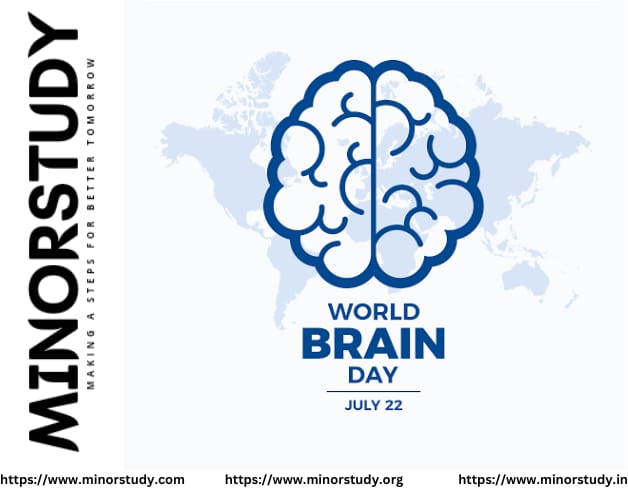🧠 World Brain Day: 7 Inspiring Reasons Why It’s a Powerful Celebration of the Mind
Introduction
World Brain Day: Our brain—so delicate, so complex—drives everything we do: breathing, dreaming, learning, loving, and creating. Yet, despite its importance, brain health often gets sidelined. That’s why World Brain Day exists: to shine a global spotlight on our most vital organ.
- 🧠 World Brain Day: 7 Inspiring Reasons Why It’s a Powerful Celebration of the Mind
- Introduction
- 1. History of World Brain Day
- 2. Timeline of World Brain Day
- 3. Fascinating Facts About the Brain
- 4. Frequently Asked Questions (FAQs)
- 5. Significance of World Brain Day
- 6. How World Brain Day Is Observed
- 7. Important Points You Should Know
- 8. Wishing Messages for World Brain Day
- 9. Daily Life Impact
- 10. Societal Importance of World Brain Day
- 11. Conclusion: Why World Brain Day Matters
In this friendly yet insightful article, we’ll explore:
The history of World Brain Day
A detailed timeline of milestones
Fascinating brain facts
Frequently asked questions (FAQs)
The significance of brain awareness
How it’s observed and celebrated
Important points you can’t ignore
Warm wishing messages
Daily life impact
Why it matters to society
A thoughtful conclusion
Ready? Let’s dive into the journey of honoring the human brain.
1. History of World Brain Day
Worldwide brain awareness took shape through World Brain Day, celebrated every year on July 22. It was launched in 2014 by the World Federation of Neurology (WFN) in partnership with local neurological societies. The goal: raise awareness of brain disorders and mental health, which affect over a billion people globally annually.
Each year spotlights a theme—past themes include stroke, epilepsy, dementia, Parkinson’s disease, and mental health—illuminating pressing brain-related issues and encouraging education and action.
2. Timeline of World Brain Day
| Year | Theme | Significance |
|---|---|---|
| 2014 | Stroke | #Brain4Stroke aimed at reducing stroke risk and promoting rehab |
| 2015 | Epilepsy | #Brain4Epilepsy fought stigma and encouraged treatment |
| 2016 | Dementia | #Brain4Dementia pushed for early diagnosis and support |
| 2017 | Brain Health Across Lifespan | #Brain4AllLife focused on prevention at every age |
| 2018 | Brain Health in Children and Youth | #Brain4Youth emphasized neurodevelopment |
| 2019 | Brain Health in Older People | #Brain4MyGeneration highlighted aging challenges |
| 2020 | Brain Health for All | A universal call amid the pandemic |
| 2021 | Stop MS & Promote Brain Health | #Brain4MS did advocacy for multiple sclerosis |
| 2022 | Brain Health & Environment | Focused on pollution’s effect on brain health |
| 2023 | Migraine | #MakeMigraineSeen raised migraine awareness |
| 2024 | Brain Health & Climate Change | Highlighted environmental impacts |
| 2025 | TBD | The upcoming theme underscores emerging concerns |
3. Fascinating Facts About the Brain
The adult brain weighs about 1.4 kg and uses 20% of our daily energy.
Every second, the brain sends and receives around 100,000 nerve impulses.
It contains roughly 86 billion neurons, forming trillions of connections.
Brain rewiring—neuroplasticity—means we can learn and heal well into old age.
One in four people worldwide will experience a neurological or mental health disorder in their lifetime.
Dementia affects nearly 55 million globally; nearly 10 million new cases are reported each year.
Strokes occur every 2 seconds, killing more people annually than breast or prostate cancer combined.
Migraine is the third most common disease globally and the top cause of disability in under-50s.
Sleep is vital—it helps the brain clear toxins and consolidate learning.
These facts reveal the importance—and fragility—of our brain.
4. Frequently Asked Questions (FAQs)
Q1. Why is World Brain Day July 22?
It was chosen with input from neurologists worldwide and aligned with WHO’s focus on brain disorders.
Q2. Who leads World Brain Day campaigns?
The World Federation of Neurology (WFN) collaborates with international and national neurological societies.
Q3. What has World Brain Day achieved?
It has raised awareness, promoted early diagnosis, reduced stigma, influenced policy, and encouraged research funding globally.
Q4. How can individuals participate?
Share social media posts, host webinars, get brain health checks, or donate to brain research charities.
Q5. Is World Brain Day only for patients?
Not at all! It’s for everyone—patients, caregivers, researchers, healthcare professionals, and policymakers.
5. Significance of World Brain Day
Fights Stigma: Breaking mental health misconceptions and encouraging open conversations
Promotes Prevention: Risk reduction for stroke, dementia, and neurological disorders
Strengthens Health Systems: Encouraging neurologist training and access to care
Drives Research Funding: Mobilizing policy and donors for cutting-edge brain science
Empowers Patients & Caregivers: Providing information, support, and hope
6. How World Brain Day Is Observed
Educational Campaigns: Infographics, webinars, podcasts, and expert interviews
Health Screenings: Blood pressure, memory checks, neurological evaluations
Walks, Runs & Community Events: Engaging people in brain-health pledges
Virtual Conferences: Highlighting the latest in brain science
Social Media Advocacy: Sharing hashtags like
#WorldBrainDayand#BrainHealthPolicy Advocacy: Submissions to governments and WHO for better brain care
7. Important Points You Should Know
Brain disorders cause more disability than any other group of diseases.
Early recognition and treatment can significantly improve outcomes.
Lifestyle choices—like exercise, diet, sleep, stress reduction—directly affect brain health.
Mental health is brain health, not a separate issue.
Access to care is unequal, especially in low-income and rural areas.
8. Wishing Messages for World Brain Day
Celebrate with positivity and warmth. Here are some wishes you can share:
💬 “On World Brain Day, let’s honor the brilliance inside us—and the minds dedicated to protecting it!”
💬 “Here’s to brain health: May your mind stay sharp, brave, and brilliantly alive.”
💬 “A healthy brain leads to a hopeful life—happy World Brain Day to all guardians of the mind!”
💬 “To researchers, caregivers, doctors, and advocates—thank you for lighting the way to better brain health.”
9. Daily Life Impact
Self-Awareness & Monitoring: Headaches, forgetfulness, mood shifts, or dizziness may signal deeper issues.
Prevention is Power: Blood pressure, cholesterol, stress, sleep, and exercise are all key.
Early Diagnosis Matters: Conditions like stroke, Parkinson’s, or epilepsy are more manageable when caught early.
Care & Rehabilitation: Stroke survivors can regain independence with therapy and neurological support.
Cognitive Resilience: Lifelong learning, social interaction, and mindfulness help delay cognitive decline.
10. Societal Importance of World Brain Day
Promotes Equity: Pushes for better brain care in underserved communities
Boosts Public Health: Effective brain health strategies strengthen overall health systems
Economic Gains: Reducing neurological disability preserves workforce productivity
Innovation Driver: Funding brain science leads to breakthroughs in AI and neurotech
Social Capital: A brain-healthy society is more creative, productive, and empathetic
11. Conclusion: Why World Brain Day Matters
Our brain is the core of our existence—shaping how we think, feel, remember, and dream. World Brain Day reminds us not to take this extraordinary organ for granted.
From combating neurological diseases to promoting mental well-being, World Brain Day catalyzes global awareness, policy, research, and everyday action.
Let’s honor the mind—protect it—with awareness, care, empathy, science, and unity.
“A healthy brain is the foundation of a healthy life—let’s cherish and protect it together.”








